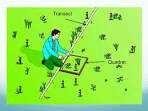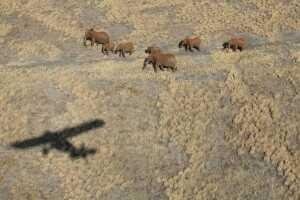To establish and to appraise management
practices, wildlife managers must estimate the
sizes of wildlife populations.
There are two methods involved in wildlife population assessment which includes;
Direct counting
Indirect counting
DIRECT COUNTING: its divided into two;
i) Aerial counting
ii) Transect counting
i) AERIAL COUNTING: this is the most widely used method because it covers large area very quickly. This involves small aircraft, tape recorder and automatic camera. The given area is divided into stripes of about 3-5km apart.
Experienced pilots are used for animal censoring. The air craft fly so low at about 50-100m high along each stripes at about 150km/hr while the observers inside the aircraft on both sides are restricted to count the animals sighted within a given area through the window glass of the air craft which is being recorded by the tape recorder. Automatic camera can be used to take animals and vegetation which can later be interpreted.
ii) *THE TRANSECT COUNT":
Transect line can be constructed within the area to be counted. Transect can be either straight line, square or rectangular in shape depending on which one suits the area to be counted and this depend on the topography and accessibility of the area. But whichever transect you use, the transect should be bias free and must be a good representation of the area to be studied. The bearing is very important because it helps to calculate perpendicular distance and angle.
Transect should be long enough e.g 3.5kmin a forested area and about 9-12km in a savannah area. In a forested area, it is always advisable to use straight line transect method because it is always very difficult to construct square and rectangle transect due to the thick vegetation. While in the savannah area, square and rectangle transect can be used. After the construction of transect, is always advisable to leave it for 2 to 4 days before observations are made because a lot of disturbances must have been made during the construction of the transect which must have driven the animals away. Transects are better observed in the early hours of the day between 7 and 12 noon and later in the day between 4 and 7pm. The transect is quietly trekked by the observers with a speed limit of 1-1.5km/hr in forested area and 1.5-2.0km/hr in the savannah. The observations are recorded on any group of animal sighted viz;
The species
i) The number of group sighted
ii) Sighting mood( the activities of animals that period sighted)
iii) The habitat
iv) The number of adult and young (male and female)
v) Number of individuals
vi) Sighting distance
vii) Sighting angle
viii) Perpendicular angle.

- INDIRECT COUNT:
This involves counting of animals index such as animal fecal dropping, foot prints, calls, nest, tracks, etc. this can be related to relative abundance of an animal species in a particular area at a particular time. The reason for using animal index is that the object is easier to count than the animal itself. However, counting of animal index generate a lot of controversy because it involves proper identification of each animal index which are usually very difficult to identify even by experienced wild lifer. Any method employed in making the estimate of an animal species must be chosen specifically for a particular species considering time, place, area and purpose. Adequate precaution is very relevant because indirect methods are not commonly used by beginners in wildlife management probably because some of the methods require some basic knowledge about the behaviour of the animals concerned while others involve special field in science but because of the behaviours of some animals and different vegetation types especially in thick forest where the direct method cannot be used, this method at least provides estimate about the population. Some of the indirect methods are;
i) Pellet group count method
ii) Capture and recapture method
iii)Use of animal tracks
iv)Remote sensing techniques.


We can be good friends because we both are nature lovers, we can help each other to build ourselves at steemit by resteeming each others posts, i started following u i hope u will follow me back. And gave u an upvote
Peace, Abundance, and Liberty Network (PALnet) Discord Channel. It's a completely public and open space to all members of the Steemit community who voluntarily choose to be there.Congratulations! This post has been upvoted from the communal account, @minnowsupport, by simaoatb from the Minnow Support Project. It's a witness project run by aggroed, ausbitbank, teamsteem, theprophet0, someguy123, neoxian, followbtcnews, and netuoso. The goal is to help Steemit grow by supporting Minnows. Please find us at the
If you would like to delegate to the Minnow Support Project you can do so by clicking on the following links: 50SP, 100SP, 250SP, 500SP, 1000SP, 5000SP.
Be sure to leave at least 50SP undelegated on your account.
You can support us by donating steem/sbd or delegating sp to steemainsarena trail to acknowledge our mission.
Your post has been upvoted by the @steemainsarena community trail. Our goal is to support minnows on steemit to help them grow. You can join our discord server here; https://discord.gg/zpm2sdd